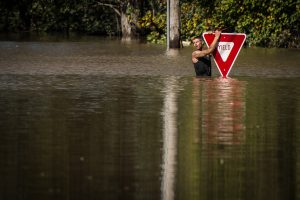Hurricanes
Hurricane Matthew caused more than 25 fatalities across the Carolinas, all but one due to flooding.
Recent research suggests that the Atlantic hurricane season may be getting longer and hurricanes may become more intense, as sea surface temperatures steadily increase. This means that Carolina communities should prepare for the possibility of more major hurricanes (i.e., Category 3-5) in the coming decades, though the probability of a landfall can vary significantly from one year to another. While high winds and isolated tornadoes are certainly a hazard during a hurricane landfall, heavy rainfall can produce extensive river flooding events that lasts for days and weeks following the hurricane. Hurricane Matthew caused more than 25 fatalities across the Carolinas, all but one due to flooding. Additionally, thousands of people were displaced from their homes, and as of April 2017, more than 300 families in North Carolina remain displaced.

Human Health Impacts (Coming Soon!)
Climate Extremes
Select a climate extreme to access tools and learn more about community vulnerability and health impacts.


